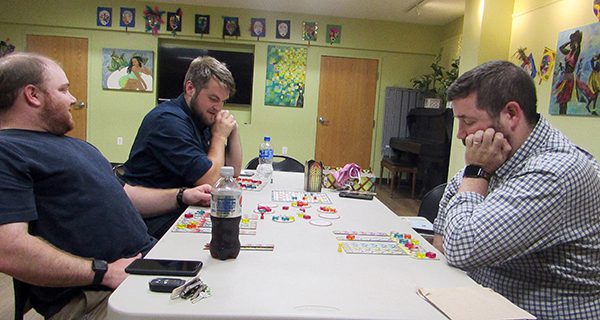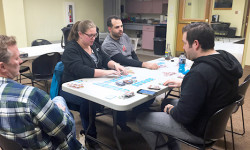[ccfic caption-text format="plaintext"]
By Amelia Tarallo
Hometown Weekly Staff
Game night is a time-honored tradition for friend groups and families alike. From basic card games, like go fish, to more complicated games like Monopoly, people get excited when it comes to playing a good game with their closest compatriots.
Twice a month, one group meets at the Dover Library to enjoy their own version of game night. Members of Massachusetts Fun and Games meet together in the community room after the library has closed for the night. Bringing their own games, they decide what to play during the meeting.
On Thursday, July 18, the group decided to play Gizmos and Azul.
The group played a short game before launching into Gizmos. Gizmos, originally a European tabletop game, requires careful strategy in order to win. With cards laid out on the table and an “energy dispenser” to hold marbles, everyone was ready to play the game. In Gizmos, players use marbles (or “energy spheres”) and different strategy cards to make machines and inventions. The game ends when a player creates 16 different machines, after trading in different colored marbles to gain different cards.
“And since I started, if I get 16 first, then everyone gets another turn,” explained one player, Jim.
“Suspiciously,” retorted Jeff. “These are all terrible cards, but I can make them work,” he said as he looked at his own options.
The type of games this group plays are sometimes referred to as “Eurogames.” Unlike many of the more traditional American games, like Chutes and Ladders or Pictionary, these games require strategy in order for a player to be successful. “The point of these games is to remove as much luck from the game as possible,” explained Jim. In the case of Gizmos, players, for the most part, know exactly what they are getting, whether it be the colors of marbles or the types of cards they’re dealt.
These types of games have gradually become more popular in the United States. In the last year or so, they have become available in major chains like Target. Previously, they were only found at specialty game shops. Enthusiasts of the genre, though, have been collecting for years, despite their Stateside rarity.
“I have about 200 of these types of games,” said Jim.
The next game, Azul, used the concept of a no-luck based game even more than Gizmos.
In Azul, using a bag, one player picks random glass tiles and places them into the "factory" coasters in the middle. Players then choose one of the factory places, taking all of one color from that one area and placing the rest of the glass from that area into the middle. Players will then place these tiles on their five by five board. The gradual goal is to fill up each of these "windows" with matching stained glass to those on the board. When a player gathers enough for one of these windows, they then flip it over for the next window. This continues until a player manages to complete their entire board, adding points for finished windows along the way. In some ways, it’s like a more complicated version of bingo.
Though quicker than Gizmos, the three players played with the same level of intensity, exchanging snarky remarks as they made their way through the game. “How did you get 12?” Andrew asked, questioning Jeff’s points.
“Do you know what you’re picking?” Jeff asked Jim during his turn.
“Well, you better finish so I can take my turn.”
By the end of the game, Jeff and Jim had tied.
What would normally be a boring Thursday night turned into a fantastic game night for members of Massachusetts Fun and Games. The next game night will surely bring the same level of fun for players, if not more.
And who knows? They even may find a new game to play between now and then.

























